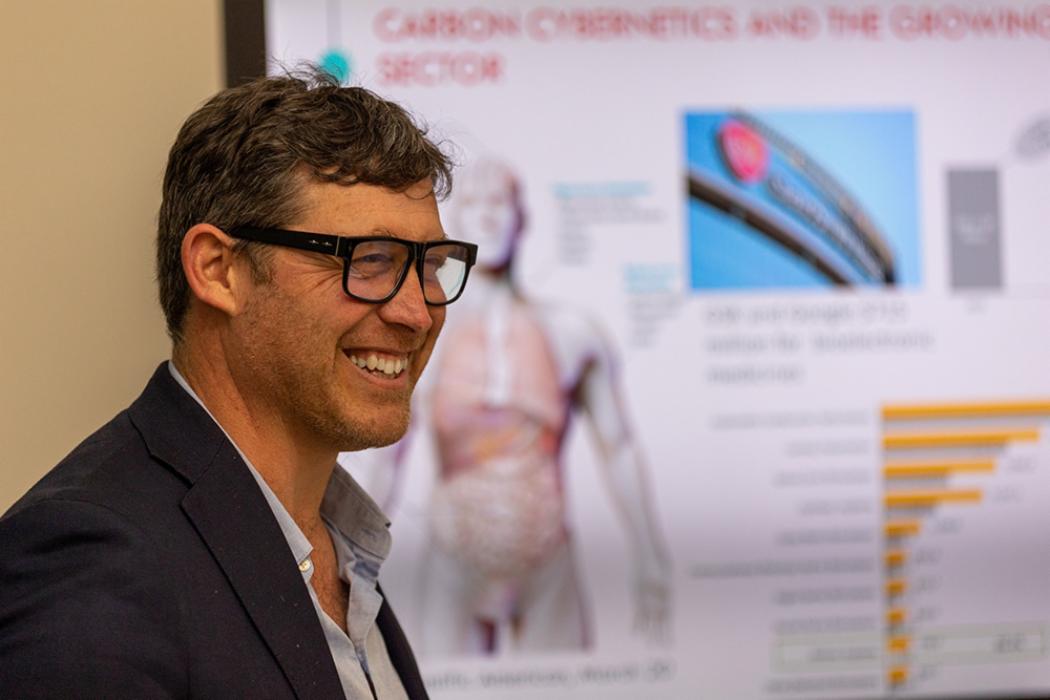What drew you to study economics at UC in the first place?
I was actually seriously considering a career in law as I really liked English and debating at high school. But in my final year at school I picked up economics and it just clicked, I loved the combination of maths and business with a bit of psychology thrown in there. The appeal of UC was the great reputation of the university’s commerce faculty plus getting to live in Christchurch. All of the clubs and social activities on offer at Canterbury were an added bonus too.
How did your time at UC set you up to enter the professional workforce?
A few key things really helped. One was the great options around internships and career support. I secured an internship at the Reserve Bank of New Zealand between my undergraduate and graduate degrees which gave me a great experience of being out in the working world before I’d completed my studies.
The other was involvement in different clubs and organisations which actually gave me a taste of working with others to essentially run mini businesses with budgets and stakeholders to deliver events and services for students.
Can you give us a bit of an overview of your career so far?
After interning at the RBNZ, I headed back there as a graduate where I worked across a couple of different teams in the financial markets department over about four years, with a couple of years working in markets in London in between roles. Then an opportunity to join Kiwibank’s growing economics team came up and I moved into an Economist role there – putting the economics part of my degree to good use! From there I progressed to Senior and then Chief Economist. I then took a bit of a tangential step into the retail product management space at Kiwibank as Head of Transactions and Payments – which was the team that looked after all the bank’s card products, everyday accounts and domestic payments. After that, I decided to shift back into the economics world, this time as Chief Economist at Deloitte before getting back into a more financial markets-orientated role at Forsyth Barr.
What does being an ‘Investment Strategist’ at Forsyth Barr actually see you do?
In my current role I get to combine economics and financial markets together which is amazing. I spend a fair bit of time examining economic data and trends as well as financial market conditions to provide insights that support investment portfolio management. An important part of the role is communicating with a wide range of audiences what’s been happening with different asset classes, why, and what the outlook and risks are.
What is the most challenging part of your job? What is the most rewarding?
The most challenging part is probably the sheer volume of financial and economic information available and deciding what is noise and what has substance that can help form views on investment strategies.
The most rewarding is getting to help inform and educate people on what’s going on in the economy and financial markets and how it can impact them.
How has the investment landscape changed over the past few years? The pandemic, house prices and the growth of investing platforms must make it an interesting place.
The pandemic was certainly a once-in-a-lifetime (hopefully!) event in the way that it created a highly unusual artificial economic cycle that we are still seeing the after-effects from. We saw an unprecedented level of fiscal and monetary stimulus, a big increase in all major asset prices, including shares and property, and then as interest rates rose most of these gains were reversed. That has added quite a lot of volatility to equity and housing markets in recent years. As New Zealanders have started to look outside of the housing market for other options to grow their wealth, we have seen the rise of solutions to make investing more accessible - especially for those earlier on in their investing journey. At Forsyth Barr we recently launched Tempo which is digital investment solution that helps guide people toward their savings and investing goals. Tempo provides customised advice tailored to your goals and investor type, sorts out any tax obligations, and has no minimum investment amount required – making it super easy to get started!
What advice would you offer to recent grads looking to follow a career path similar to yours?
Be open to a range of roles initially. Graduate programs are generally a great starting point and can often give you a taste of different areas of an organisation. The CFA qualification is also worth considering if you’re interested in the finance industry and you can start this while still at university.
More alumni stories
David Garrett
07 November 2025
BSc Chemistry 2007, BSc(Hons) Chemistry 2007, PhD Chemistry 2011
CEO and Co-Founder, The Carbon Cybernetics Group
Associate Professor of Biomedical Engineering, RMIT University










